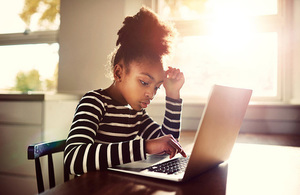Government launches major new drive on internet safety.
Ensuring the UK becomes the safest place in the world for young people to go online .

Young girl using laptop computer
-
UK to be safest place in the world for young people to go online
-
Parents now more concerned about their children sexting than drinking or smoking
Ministers have begun work on a new Internet Safety Strategy aimed at making Britain the safest country in the world for children and young people to be online.
Culture Secretary Karen Bradley is leading the new cross-Government drive on behalf of the Prime Minister – with a green paper expected in the summer.
A report has been commissioned to provide up to date evidence of how young people are using the internet, the dangers they face, and the gaps that exist in keeping them safe. Sonia Livingstone is leading this work together with Professor Julia Davidson and Dr Jo Bryce, on behalf of the UK’s Council for Child Internet Safety (UKCCIS) Evidence Group.
Ministers will also hold a series of round tables in the coming weeks with social media companies, technology firms, young people, charities and mental health experts to examine online risks and how to tackle them.
The work is expected to centre on four main priorities: how to help young people help themselves; helping parents face up the dangers and discuss them with children; industry’s responsibilities to society; and how technology can help provide solutions.
The focus will be on preventing children and young people from harm online and making the internet a safer place.
The round tables are also expected to examine concerns around issues like trolling and other aggressive behaviour including rape threats against women.
They will involve ministers and officials from departments across Government including the Home Office, Department for Education, Department of Health and Ministry of Justice as part of a co-ordinated effort to make the internet safer.
It comes amid growing fears that the threat from online dangers has grown far more quickly than society’s response to them, and worries that tech-savvy young people are being exposed to risks that their parents never were and might not know how to confront – like sexting, cyber bullying, and content which promotes self-harm, suicide and eating disorders.
A recent poll found more parents were concerned about sexting than about their children drinking or smoking. The YouGov survey for the PSHE association showed 78% were either fairly or very concerned about sexting, compared to 69% who concerned about alcohol misuse and 67% who were concerned about smoking.
A study last year for the NSPCC and Children’s Commissioner found 13% of 11 to 16 year-olds reported that they had taken topless pictures of themselves and 3% had taken fully naked pictures of themselves. More than one in 10 young people say they have been the victim of cyber bullying, and self-harm among children is on the rise amid evidence of a link between internet use and an increased risk of self harm.
Karen Bradley, Secretary of State for Culture Media and Sport, said:
The internet has provided young people with amazing opportunities but has also introduced a host of new dangers which children and parents have never faced before.
It is increasingly clear that some behaviours which are unacceptable offline are being tolerated or even encouraged online – sometimes with devastating consequences. “We are determined to make Britain the safest place in the world to be online, and to help people protect themselves from the risks they might face.
To do that we want to understand the full scale of the problem and explore how everyone - including Government, social media companies, technology firms, parents and others - can play their part in tackling it.
Notes to editors
This new work builds on a range of Government initiatives around internet safety, including the Home Office’s world-leading efforts to combat to combat child sexual exploitation and abuse.
In December, Home Office minister Baroness Shields was appointed the PM’s Special Representative on Internet Crime and Harms, with an international focus on internet safety and security working with global technology companies and other governments to protect UK citizens. As part of the move, Department for Culture Media and Sport Minister Tracey Crouch took on responsibility for domestic online safety.
It also comes as the Department of Health is developing a green paper on children and young persons’ mental health, expected in the Autumn and measures in the Digital Economy Bill currently going through Parliament will introduce age checks for pornographic websites so under-18s cannot view harmful content – with powers to block sites which refuse to comply.
Sonia Livingstone is a professor of Social Psychology at the London School of Economics. Her empirical work examines the risks and opportunities from digital technologies, including for children and young people. She serves on the Executive Board of the UK’s Council for Child Internet Safety (UKCCIS) and has advised various Government departments and public bodies
Prof Julia Davidson is Professor of Criminology & Co-Director of the Centre for Abuse & Trauma Studies at the University of Middlesex and Dr Jo Bryce is senior lecturer in psychology and Director of the Cyberspace Research Unit at the University of Central Lancs.